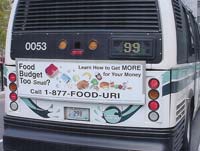 It
is well known that reaching food stamp audiences
with effective nutrition education messages that
motivate behavior change is difficult. The “aperture” in
social marketing, i.e. the time, place and circumstance
when the target is most likely to be receptive to
intervention, may well be while utilizing mass transportation.
In Rhode Island, a focused social marketing effort
targeting food stamp eligible families was launched
using multiple modes of mass transit advertising. It
is well known that reaching food stamp audiences
with effective nutrition education messages that
motivate behavior change is difficult. The “aperture” in
social marketing, i.e. the time, place and circumstance
when the target is most likely to be receptive to
intervention, may well be while utilizing mass transportation.
In Rhode Island, a focused social marketing effort
targeting food stamp eligible families was launched
using multiple modes of mass transit advertising.
The goal of
the University of Rhode Island’s USDA-funded
Family Nutrition Program has been to promote the
benefits of healthy eating within the constraints
of a limited budget. Stretching the food dollar,
and increasing consumption of fruits, vegetables,
and calcium have been key campaign themes. These
themes have been delivered to the target population
through large bus shelter posters, interior and exterior
bus card posters, interior bus digital messaging
, and print media. Bus shelter posters (4’ x
6’) were designed, displayed and rotated throughout
targeted, high food stamp caseload neighborhoods.
The first two rounds of posters sported six different
whimsical facial expressions composed of a variety
of healthy foods. Richly colored and eye-catching,
the posters promoted key campaign messages using
minimal text and a prominent toll-free number. Newer
designs utilizing the mass transit system have promoted
the themes of stretching the food dollar, container
gardening, and healthy weights in children. Evaluation
methods have included mass transit user surveys,
key informant interviews, and hotline call tallies.
Over 30,000 copies of educational materials developed
to reinforce campaign themes have been distributed
by way of direct mail to hotline callers and through
food stamp offices, schools, and health centers serving
the food-stamp eligible population.
Click on any of these
posters to enlarge

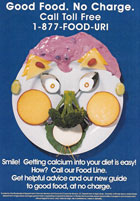
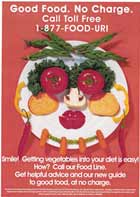
Once again utilizing the
Rhode Island Mass  Transit system, three messages
promoting a healthy lifestyle for children as a means
for combating childhood obesity have been developed.
The newly launched campaign appears on interior and
exterior bus panels. Messages are targeted towards
low-income parents with information on simple ways
to achieve healthier weights in their children. Key
messages are Eat Breakfast, Move More, and Add More
Fruits and Vegetables. Free recipes, tip sheets and
personalized information are available by calling
the prominently displayed toll-free hotline. The
posters will also be duplicated for display in food
stamp offices, Title I school cafeterias, and health
centers serving the target audience. Transit system, three messages
promoting a healthy lifestyle for children as a means
for combating childhood obesity have been developed.
The newly launched campaign appears on interior and
exterior bus panels. Messages are targeted towards
low-income parents with information on simple ways
to achieve healthier weights in their children. Key
messages are Eat Breakfast, Move More, and Add More
Fruits and Vegetables. Free recipes, tip sheets and
personalized information are available by calling
the prominently displayed toll-free hotline. The
posters will also be duplicated for display in food
stamp offices, Title I school cafeterias, and health
centers serving the target audience.
Back
to top
 The
Good Food Gives Good Life campaign successfully collaborated
with the Providence Public Library to design two sets
of literacy / nutrition education materials for use
with low-income ESL adults and families with young
children. The “Food
Talk-ESL” curriculum was
developed to introduce adults learning English to the
concept of healthy eating. The curriculum consists
of four low-literacy lesson plans introducing such
topics as the USDA Food Guide Pyramid, label reading,
unit pricing and food safety. The curriculum also included
student activities and background materials for leaders.
Three teaching cycles using the Food Talk Curriculum
have been completed, reaching 268 food stamp eligible
patrons of the Providence Public Library. The
Good Food Gives Good Life campaign successfully collaborated
with the Providence Public Library to design two sets
of literacy / nutrition education materials for use
with low-income ESL adults and families with young
children. The “Food
Talk-ESL” curriculum was
developed to introduce adults learning English to the
concept of healthy eating. The curriculum consists
of four low-literacy lesson plans introducing such
topics as the USDA Food Guide Pyramid, label reading,
unit pricing and food safety. The curriculum also included
student activities and background materials for leaders.
Three teaching cycles using the Food Talk Curriculum
have been completed, reaching 268 food stamp eligible
patrons of the Providence Public Library.
For preschool children and their families,
four Cradles
to Crayons Reading Kits were developed
to combine family reading time with nutrition education.
These kits include the following: Animal
Action ABC,
Lunch, I
Need a Lunchbox, and Pete’s
a Pizza. The
kits feature four books with a food and / or physical
activity theme at a reading level appropriate for preschool-age
children. Accompanying materials developed and included
in each of the four kits were games and crafts specific
to the particular book subject and which reinforced
nutrition themes. The four kits were each duplicated
for a total of 24 kits. Reading Kits are currently
in circulation in four branches of the Providence Public
Library serving low-income neighborhoods as well as
at the library a the State Department of Corrections,
for use by women inmates and their children, and the
library at the area Children’s Hospital.
Due to the success of the preschool
kits, four additional Nutrition Reading Kits were developed
to serve middle-school aged children (2 books) and
new mothers (2 books). These kits are checked out like
other library books and nutrition handouts of interest
can be retained for personal use by the reader. The
second set of kits include the following and are currently
in circulation at the Providence Public Library: Salsa
Stories, One Grain of Rice, How
Should I Feed My Child? and Pregnancy
Nutrition - Good Health for You and Your Baby.
Knowing that low-income families utilize
free library internet access, a list of interactive
nutrition and food safety web sites was compiled and
uploaded onto the Providence Public Library web site.
Web sites were carefully selected and categorized for
target audience (e.g. adults, children grades K-3,
4-8, 9-12, teachers), and rated for accuracy of information,
skill level needed, and ease of use. Users can visit
these interactive nutrition sites to select and learn
about topics of interest for themselves, their children,
or their classroom. New sites will be added periodically
in order to keep the information current.
Providence
Public Library Site
Success Stories
Feedback from
both parents and librarians about the Providence
Public Library Nutrition Reading Kits has been overwhelmingly
positive. One mother of a five-year-old stated, “I
love the kit, Pete’s a Pizza. the activates
are fun and it allied my child to become excited
about food. Now I let him pick out any kit her wants
- it is very exciting for him.” Attitudes about
healthy eating and good nutrition have been positively
changed in school-aged children, according to the
librarians. one librarian stated, “Kids love
the nutrition kits, they go right for the kits at
the after-school programs.” The kits are also
used in the Creating Readers curriculum for kids
age 4-5. The program director had this to say about
the nutrition kits: “These are great because
they are more than a book! The hands-on activities
extend the message for children and parents. The
kits are easy to tie in with what parents are trying
to teach their children. And once one nutrition kit
is taken out, parents tend to take out the entire
series.”
Back to top
Food Demonstrations
Expanding its reach to the target
audience in an even more accessible approach, the campaign
implemented cooking demonstrations that were conducted
at food stamp offices throughout the state of Rhode
Island. A series of hands-on workshops were conducted
at public library branches serving target neighborhoods.
These programs allow food stamp participants and food
stamp eligible families and individuals to receive
and utilize free nutrition education materials promoting
the desired messages. Sample recipes incorporating
low cost, high nutrient density foods were prepared
and offered to participants to help promote the message
that easy and flavorful nutritious meals using low-cost
ingredients are possible. The most popular recipes
demonstrated were Bean and Cheese Quesadillas, Carrots
with Tomatoes and Macaroni, and Pyramid Roll-Ups.
Success Stories
 The
cooking demonstrations at state Food Stamp offices,
health centers and food pantries have been extremely
well received. Many clients are surprised to learn
that the food samples and information are free. One
woman stated, "Is this free? This food is so good!
I can’t believe there are beans in this recipe!” After
trying the recipes with beans and vegetables, many
client are pleasantly surprised at the taste. They
take the recipes and are excited about making the new
foods for their families. Children also enjoy eating
the samples, and their attitudes about vegetables often
change for the better. They are more open to eating
new and different foods. In addition, many of the employees
at these centers have enjoyed seeing their client’s’ perceptions
about healthy eating improve. Many employees ask, “When
are you coming back? This is a wonderful service for
our clients." May I take some materials to give
out to clients on other days?” The
cooking demonstrations at state Food Stamp offices,
health centers and food pantries have been extremely
well received. Many clients are surprised to learn
that the food samples and information are free. One
woman stated, "Is this free? This food is so good!
I can’t believe there are beans in this recipe!” After
trying the recipes with beans and vegetables, many
client are pleasantly surprised at the taste. They
take the recipes and are excited about making the new
foods for their families. Children also enjoy eating
the samples, and their attitudes about vegetables often
change for the better. They are more open to eating
new and different foods. In addition, many of the employees
at these centers have enjoyed seeing their client’s’ perceptions
about healthy eating improve. Many employees ask, “When
are you coming back? This is a wonderful service for
our clients." May I take some materials to give
out to clients on other days?” 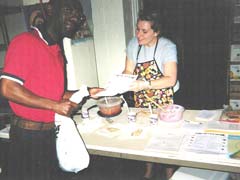 After
each cooking demonstration, free nutrition education
materials and recipes are provided for clients in the
waiting areas. All of the information provides the
FSNEP toll-free number should the client have further
comments or questions. After
each cooking demonstration, free nutrition education
materials and recipes are provided for clients in the
waiting areas. All of the information provides the
FSNEP toll-free number should the client have further
comments or questions.
Enjoy these recipes !
Pyramid Roll-Up
Yogurt Parfait
Quesadillas
Carrots
with Tomatoes & Macaroni
Back to top
For the first time, nutrition education
outreach will extend to the food stamp eligible female
population transitioning from the Women's Facility
at the Rhode Island Department of Corrections. The
average age of these women is 34 years, ranging from
18-62 years. Female prison census as of March 2002
was 133, with an average length of stay of 5.1 months.
Women transitioning from prison have unique nutritional needs and many lack
basic nutrition knowledge. Most are mothers, with three-quarters reportedly
having
at least
one child, with an average of 2.3 children. Many are unskilled, and have histories
of substance abuse, physical and emotional abuse, psychiatric disorders, sexually
transmitted diseases, and low self esteem. A nutrition education needs assessment
survey for this population was developed and administered to fifty-five females
in the process of transitioning out of the Correctional Institute. A registered
dietitian conducted and evaluated the needs assessment and will deliver programming
based on survey results (see attachment #2). Results indicate that this audience
believes that choosing healthy food is important to good health and the majority
have indicated an interest in:
• General Nutrition
• Stretching Your Food Dollar
• Planning Healthy Meals
• Cooking Healthy Meals.
Survey data also indicates some lack of knowledge in the number of servings
and the correct serving sizes of foods within the food guide pyramid.
Meetings have been held with URI, the consulting dietitian, and key personnel
at the Department of Correction's Women in Transition and Mentoring Programs.
Methods under consideration for delivering nutrition education programming
include group programs at the DOC and other key outreach facilities, correspondence
courses, and computer-generated courses that would teach not only basic nutrition
and living skills but computer literacy as well.
Back to top
 In
an effort to increase vegetable consumption in food-stamp-eligible
Rhode Islanders, a container gardening campaign was
developed in Spring 2003 as an educational outreach
effort of RI FSNE. Interior bus posters promoting the "Pick
Your Own…Free" program were displayed on
Rhode Island Public Transit Authority (RIPTA) buses
whose routes penetrated highest food stamp caseload
neighborhoods. The highly visible and engaging full-color
posters, located directly behind RIPTA drivers, encouraged
interested parties to call a toll-free hotline for
program information. Eligible participants were then
enrolled in one of 12 urban container gardening workshops
led by volunteer URI Master Gardeners. A total of 225 In
an effort to increase vegetable consumption in food-stamp-eligible
Rhode Islanders, a container gardening campaign was
developed in Spring 2003 as an educational outreach
effort of RI FSNE. Interior bus posters promoting the "Pick
Your Own…Free" program were displayed on
Rhode Island Public Transit Authority (RIPTA) buses
whose routes penetrated highest food stamp caseload
neighborhoods. The highly visible and engaging full-color
posters, located directly behind RIPTA drivers, encouraged
interested parties to call a toll-free hotline for
program information. Eligible participants were then
enrolled in one of 12 urban container gardening workshops
led by volunteer URI Master Gardeners. A total of 225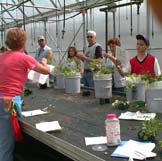 participants
planted salad ingredients -- a variety of vegetables
and herbs -- while learning container gardening principles,
health benefits of vegetable consumption, and tips
on low-cost vegetable recipe preparation. Participants
were given both the toll-free Master Gardening and
Food Stamp Nutrition hotline numbers for additional
support. All supplies, including containers, soil,
and vegetables, were donated by local Rhode Island
businesses. Anecdotal feedback of the workshops was
overwhelmingly positive, and follow-up evaluation surveys
of participants indicated that as a result of the program,
90% increased their vegetable consumption. participants
planted salad ingredients -- a variety of vegetables
and herbs -- while learning container gardening principles,
health benefits of vegetable consumption, and tips
on low-cost vegetable recipe preparation. Participants
were given both the toll-free Master Gardening and
Food Stamp Nutrition hotline numbers for additional
support. All supplies, including containers, soil,
and vegetables, were donated by local Rhode Island
businesses. Anecdotal feedback of the workshops was
overwhelmingly positive, and follow-up evaluation surveys
of participants indicated that as a result of the program,
90% increased their vegetable consumption.
Back to top
1-877-FOOD-URI |




